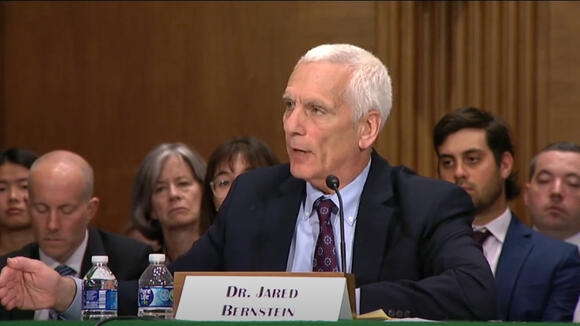
U.S. Senator Katie Britt (R-Ala.), a member of the Senate Committee on Banking, Housing, and Urban Affairs, released the following statement as the Senate prepares to vote on the nomination of Dr. Jared Bernstein to serve as Chairman of the Council of Economic Advisors (CEA).
“Make no mistake, Jared Bernstein has been one of the primary architects of the Biden Administration’s disastrous economic policies, Britt said. “The last thing that he deserves is a promotion. While hardworking Americans are struggling to make ends meet amid persistent inflation, Dr. Bernstein has pledged to double down on the same reckless tax-and-spend policies that have caused crushing pain around kitchen tables nationwide. The Senate should overwhelmingly reject this nomination and send a message to the White House that it’s past time to restore American energy dominance, slash burdensome regulations, lower taxes, and onshore good-paying jobs,”
During Dr. Bernstein’s appearance before the Senate Banking Committee in April, Senator Britt brought to light that he wants to double down on the very policies that have fueled inflation and exasperated America’s workforce shortage since January 2021.
Britt asked Bernstein:
“Do you still stand by your past comments indicating that inflation is transitory?”
Bernstein replied, “The problem with the word transitory, is that it’s become an unhelpful, and much too ambiguous term to describe the trajectory of inflation. It is true that that word, or any other word temporary, or any synonym, suggests a condition that, where inflation accelerates and then decelerates, and slows down. Now inflation peaked at nine percent in June, and most recently was seen at five percent, that’s its lowest annual grate since November of 2021. So in that sense, the view of acceleration then deceleration was correct. Transitory, however, was too temporally ambiguous a term.”
Sen. Britt replied: “OK, So you do agree, then, that the term should not have been used?”
Bernstein replied: “I think that the term was far too ambiguous, to give people a clear sense of what we were dealing with.
Sen. Britt replied: “Ya. So one of the things we need you to do as a leader and someone who advises is give the public very clear indications of what we can expect. Unfortunately, the word “transitory” for many, means temporary, it means that it would be short-lived. That’s certainly not what we’ve seen. We have seen inflation above five percent every single month, for 23-straight months, and real wages have gone down for two-straight years. One of the things that chairman Brown said about you, and it was indicated in the letter, is that you’re open to changing your mind. So once again, I just want to directly ask, that word, transitory, should never have been used.”
Bernstein replied: “I don’t want to say it should never have been used. I think that the word is not a helpful term. I think that it’s too ambiguous. I think that it doesn’t clearly. It, does not clearly delineate either what we believe to be the case, or the actual trajectory. Now, that said, it is true that we saw inflation accelerate, and we’ve seen inflation cool, but we have a lot more to go.”
Britt replied: “Would you agree that it’s lasted longer than you anticipated when you first used that term?
Bernstein replied: “Yes.”
For Britt’s second question, she asked Bernstein: “How can the American people expect different results when this administration and its economic advisers tend to look like they’re doubling-down on what I believe has not worked?”
Bernstein replied: “Thank you for the question, Senator. I respectfully would like to challenge the way you teed up some issues there. First of all, the rescue plan was actually fiscally smaller than the CARES Act, so, if that was massive, then the CARES Act was even more massive. The Inflation Reduction Act more than pays for itself. It actually reduces the budget deficit by over $200 billion over 10 years. In terms of the budget, the President’s Budget, once again, that not only pays for the proposals in the budget, but reduces the deficit by almost three trillion over 10 years. So I think that those characterizations go in a different direction that some of those that you’re suggesting, respectfully.”
Britt: “And respectfully, I would disagree. I think if we were producing more energy, I think if we were spending less money, I think inflation would not have been “transitory”, as you first put forth.”
